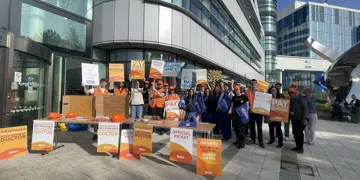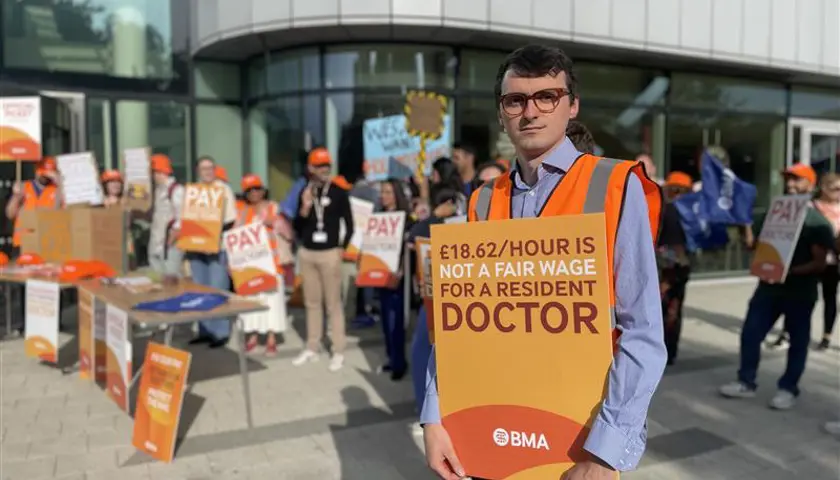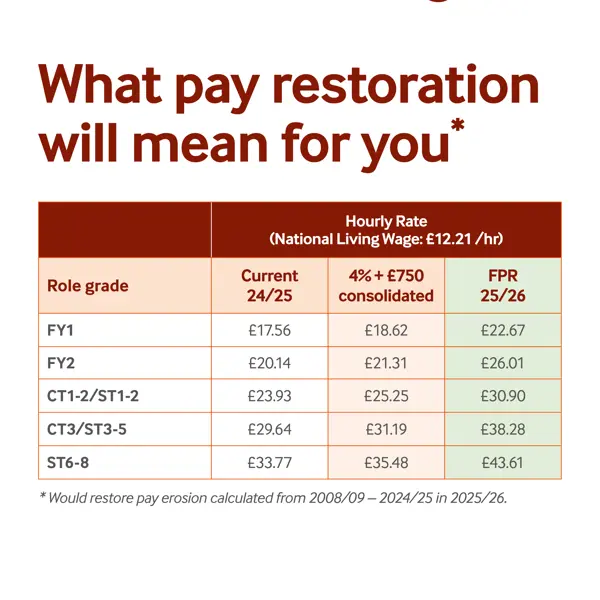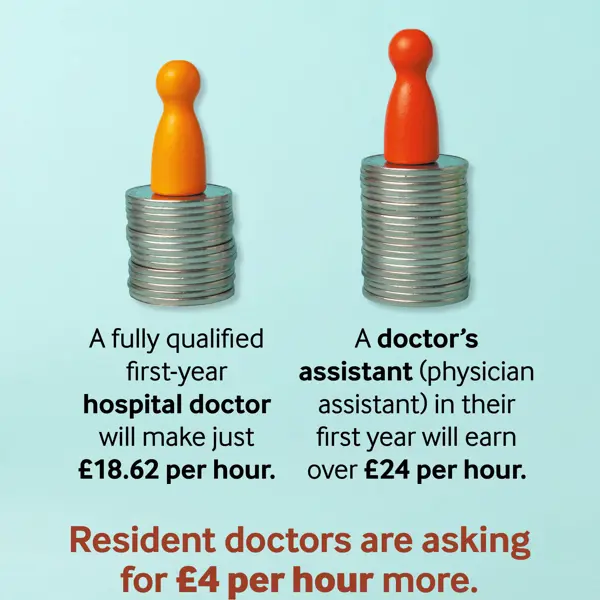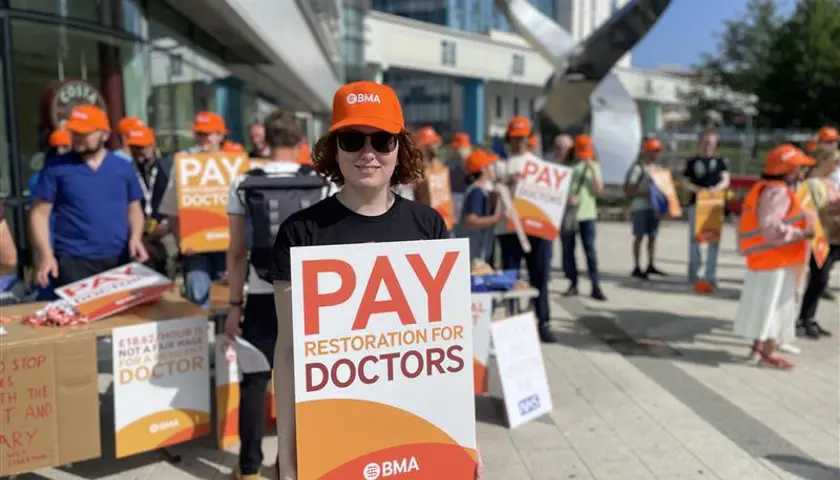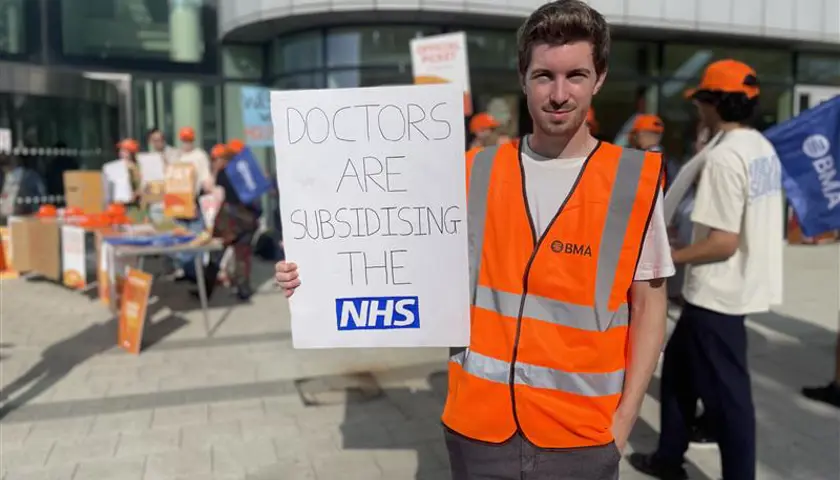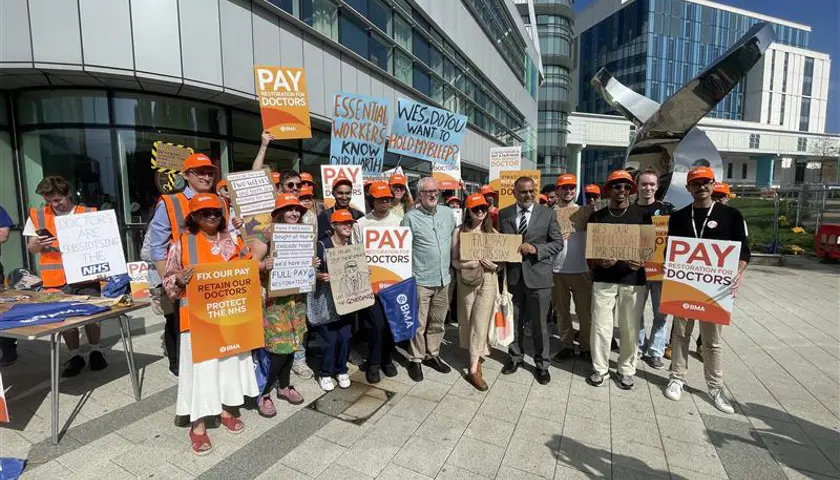Keeping up the fight
Keeping up the fight
Ben Ireland joins resident doctors on a picket line in Birmingham as they take industrial action for the twelfth time in the pay restoration campaign, the first strike under a Labour government
‘All we are asking for is for our pay to be restored.’
Foundation year two doctor Ben Cowdry reiterates the simple message that has not changed since the first round of strikes in the BMA’s pay restoration campaign back in March 2023.
It’s the same message because the ask has not changed. Resident doctors, including those picketing outside Birmingham’s Queen Elizabeth Hospital, are asking for their pay to be restored to 2008 levels in real terms. And despite some progress last year, they are far from that goal.
Health secretary Wes Streeting has agreed with the sentiment of pay restoration, setting expectations that pay restoration would be ‘a journey, not an event’ when Labour took office.
But that journey is moving at ‘a snail’s pace’, says Peter Fahey, chair of the BMA West Midlands resident doctors committee. He said that while no doctors were expecting it to happen overnight, continuing at the current rate would take many years to achieve full pay restoration - 'and that's quite unreasonable'.
The government offered resident doctors a 4 per cent uplift, plus a consolidated £750, for 2025/26 – which the RDC co-chair says represents an increase of about 1 per cent after inflation is taken into account.
The government says it gave resident doctors a 28.9 per cent pay uplift over three years last year, but the BMA points out that resident doctors’ pay is still down by 21 per cent on 2008 levels.
‘What does [Wes Streeting] expect us to do?’, says Dr Fahey. ‘We are not even back to where we were during the COVID pandemic – that’s an egregious way to treat people who continue to sacrifice their personal lives to protect patients.’
For foundation year one doctors, pay restoration would represent an uplift of just over £4 an hour on what has been offered, taking them from the £18.62 per hour offered to £22.67 per hour. For resident doctors further on in their careers, this would mean rises of between £4.70 an hour and £8.13 an hour.
Foundation year 2 Komal Doal, who had just come off a 12.5-hour night shift to join the picket line, said the government’s offer was ‘quite disappointing’. ‘The only thing we can do is to continue to fight for what we deserve.’
Deputy chair Emma Runswick, who joined the picket line with outside Queen Elizabeth Hospital in Birmingham, says doctors can’t wait 20 years for their pay to be restored.
Labour won’t be in power for 20 years, so we can’t work on that basis. If Streeting wants to make a multi-year deal, we’ll talk about that – but he only seems interested in gaslighting us and promising things he can’t deliver, or can deliver but won’t. How can we trust that?’
The BMA also notes that, even with pay restored, FY1 doctors would earn less than physician associates (PAs) in their first year, who earn more than £24 per hour.
And it is this point that really stings resident doctors. Adverts were taken out in national newspapers to communicate the disparity during the strike action.
Dr Doal says: ‘If you compare the responsibilities we have against PAs, it’s much greater. They should at least match our pay with PAs.’
Dr Cowdry adds that the five years’ training doctors undertake means they have higher debts than PAs on three-year courses, and lose two years’ of earnings in the process.
He says the fact that PAs start on rates higher than resident doctors ‘shows that there is money there’ to pay resident doctors fairly. ‘All we are asking is for our pay to be restored, and that’s still less than a PA,’ he points out.
Dr Fahey says the PA pay comparison comes up regularly on his ward walks, when he speaks to grassroots members. ‘People are offended by that,’ he says. ‘Currently, you have to be in your fifth year of work as a doctor to match what a PA earns. It seems unreasonable that the person assisting the doctor is paid more than them.’
Dr Runswick, who has been qualified six years, still earns less than some PAs. ‘I can detain people under the Mental Health Act,’ she says. ‘That is a big responsibility. Doctors are prescribing drugs, being paid less than people who are not qualified to do that. It just doesn’t stack up. We don’t want PAs to have a pay cut, we want to be paid what we’re worth.’
Five days of strike action were called on 9 July and confirmed earlier this week when the BMA’s resident doctors’ committee said negotiations with health secretary Wes Streeting were ‘lacking any substantive proposal on both pay and non-pay elements’ despite a ‘constructive’ meeting the week before.
Some 90 per cent of doctors voted in favour of industrial action in a ballot between 27 May and 7 July, on a turnout of 55 per cent. Critics of the strike action say this turnout is down on the 71 per cent it was 2023, when 98 per cent voted in favour.
Dr Runswick defends the mandate, noting that the fear of unemployment among many foundation doctors because of a lack of specialty training places means it can be ‘quite difficult to ask people to strike when they might not have an income in August’.
She says Mr Streeting also ‘fanned the flames’ of a difficult internal issue for the BMA, when policy was passed to prioritise specialty training places for doctors who qualified in the UK, which she believes lowered the turnout among the BMA’s international medical graduate members.
There are also the usual challenges such as doctors rotating and having to register in different regions.
‘Despite these reasons, we’ve got a good mandate. That shows the strength of feeling among doctors. People didn’t expect us to be back.’
In recent negotiations to try and avert strikes, Mr Streeting proposed some non-pay measures that he felt would be enough to convince resident doctors that he can improve their working lives without increasing the pay offer.
Proposals included discussions about removing mandatory costs faced by resident doctors, such as specialty training exams and portfolios and professional membership fees, as well as improving support with costs such as work equipment often funded by doctors themselves, or food.
Dr Fahey says: ‘These are all reasonable things that should be part of discussions – but they shouldn’t be a substitute for restoring our pay. And they might not help all doctors. A fair pay rise would be equitable across the board.’
The letter also included a pledge to investigate how many more medical postgraduate training posts can be created in addition to the 1,000 promised over three years in the government’s recently published 10 Year Health Plan.
Dr Cowdry says this would be welcome, but should be happening anyway to help resolve the NHS workforce crisis – and leaked suggestions that this could amount to an extra 1,000 places ‘doesn’t go far enough’.
He believes Mr Streeting was looking to make these improvements anyway, but has thrown them in now to appear like he is making concessions.
Dr Runswick said the health secretary’s proposals were ‘just an offer of talks’ and that ‘there’s nothing concrete on the table. We can’t cancel strike action for that, doctors deserve better.
‘If he wants to cancel the strikes, he knows how to achieve that.’
She notes how the leaked proposals included nothing on student loan debt forgiveness, despite the idea being heavily trailed in the media and something that could be considered as part of a wider deal.
Ujjwala Mohite, chair of the BMA's SAS doctors committee, came to support striking resident doctors on behalf of SAS members.
She said: 'If we are together we're stronger. It shows solidarity to be here with the resident doctors, whose campaign for pay restoration we fully support.'
SAS doctors and consultants have each launched indicative ballots to see if their members are willing to formally vote on whether to take industrial action as they continue their separate campaigns for pay restoration.
'We have all faced pay erosion, and we all deserve for our pay to be restored.'
Dr Runswick was among a group of BMA members who also supported striking refuse workers in Birmingham early in the morning of Friday 25 July. Some of the refuse workers, who are facing pay cuts of up to £8,000, joined the BMA picket line at Queen Elizabeth Hospital to return the favour.
The picket line was also visited by former Labour leader Jeremy Corbyn, the Islington North MP who recently launched a new party with fellow ex-Labour MP Zarah Sultana.
Mr Corbyn told doctors on the picket line: ‘You work so hard, you study for so long and go into a lot of debt. It’s not fair. I’m here to support you.’
(Images by Ben Ireland)


